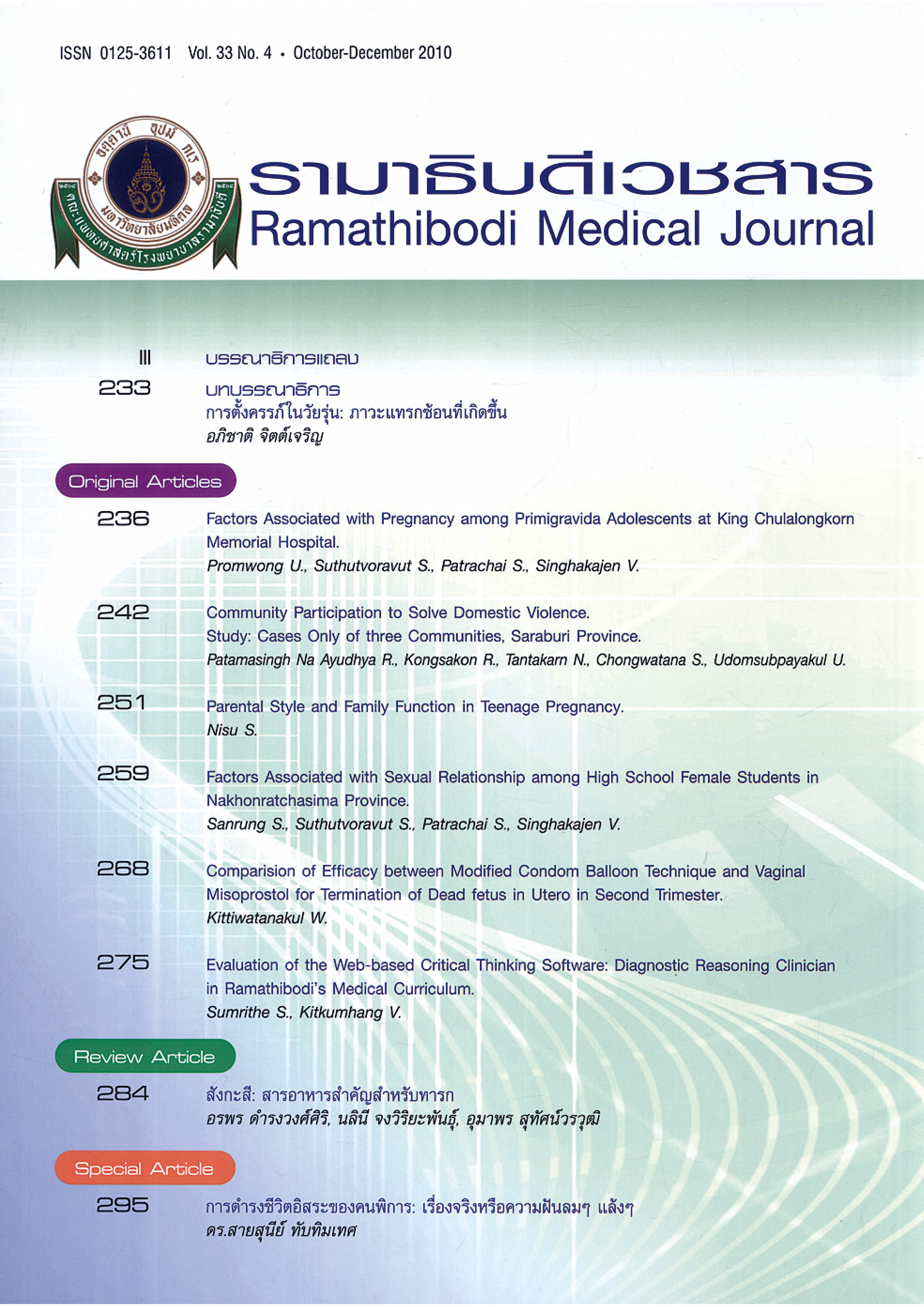Parental Style and Family Function in Teenage Pregnancy
Keywords:
Teenage pregnancy, Family parentingAbstract
Objectives: To compare parenting style and family function between pregnant teenagers and non-pregnant teenagers.
Materials and methods: Data was obtained from 39 pregnant teenagers age under 19 at teenage pregnancy clinic of Ramathibodi Hospital in 2006-2008. Controlled group were 61 girls age 13-18 years studying in a high school and has never been pregnant. The instruments employed in this study were Parental Bonding Instrument (PBI) and Chulalongkorn Family Inventory (CFI).
Results: Demographic characteristics, mean age between two groups were not different but education data, parent's income per month, accommodation pattern and parent relationship were different. Parenting style were also different. Most of the teenage pregnancy group had affectionless control parenting style (42.1%). Most of the control group had optimal parenting style (49.3%). Family function mean score of teenage pregnancy group were lower than control group in problem solving, communication, affective responsiveness, affective involvement and general function domains. By the multivariate analysis, the following factors had a significant independent association with teenage pregnancy: parent's income per month, accommodation pattern, affectionless control and affectionate constraint parenting style and family function in communication domains.
Conclusion: Low socioeconomic status, staying without parents in the house, affectionless control and affectionate constraint parenting style and poor communication skill were significantly associated with teenage pregnancy. To reduce teenage pregnancy rate, optimal parenting style and effective communication in family are highly recommended.
References
Cunningham FG, Leveno KJ. Bloom SL. Hauth JC, Gilstrap LC, Wenstrom KD. William's Obstetrics. 22nd ed. New York: McGraw-Hill; 2005:194.
Haldre K, Rahu K, Rahu M, Karro H. Individual and family factors associated with teenage pregnancy: an interview study. Eur J Public Health. 2009;19(3):266-70. doi:10.1093/eurpub/ckn143.
Imamura M, Tucker J, Hannaford P, da Silva MO, Astin M, Wyness L, et al. Factors associated with teenage pregnancy in the European Union countries: a systematic review. Eur J Public Health. 2007;17(6):630-6. doi:10.1093/eurpub/ckm014
Paranjothy S, Broughton H, Adappa R, Fone D. Teenage pregnancy: who suffers? Arch Dis Child. 2009;94(3):239-45. doi:10.1136/adc.2007.115915.
Parker G, Tupling H, Brown LB. A Parental bonding instrument (PBI). Br J Med Psychol 1979;52(1):1-10. doi:10.1111/j.2044-8341.1979.tb02487.x.
Rice FP, Dolgin KG. The Adolescent: Development, Relationships and Culture. 11st ed. Boston, MA: Pearson; 2005:212-18.
Quinlivan JA. Tan LH, Steele A. Black K, Impact of demographic factors, early family relationship and depressive symptomatology in teenage pregnancy. Aust N Z J Psychiatry. 2004;38(4):197-203. doi:10.1080/j.1440-1614.2004.01336.x.
Trangkasombat U. Family functioning in the families of psychiatric patients: a comparison with nonclinical families. J Med Assoc Thai.2006;89(11):1946-53.
Woodward L, Fergusson DM, Horwood LJ. Risk facto's and life processes associated with teenage pregnancy: result of a prospective study from birth to 20 Years. J Marriage Fam. 2001;63:1170-84.
Kanjanopas N. Game Addiction. Nakhon Pathom: Mahidol University; 2007. Available at: http://10.24.101.11/e-thesis/4836737.pdf.
Office of the Permanent Secretary, Ministry of Social Development and Human Security. Thailand Adolescent Birth Rate in 2001. Available at: http://www.m-society.go.th/content_stat_detail.php?pageid=165.













